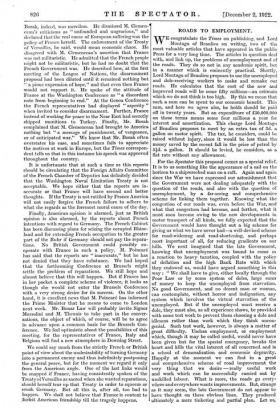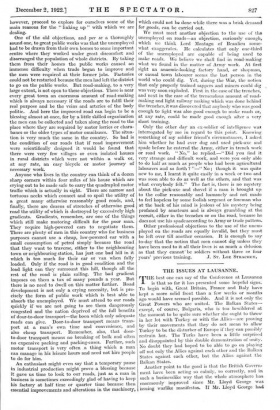ROADS TO EMPLOYMENT.
WE congratulate the Times on publishing, and Lord Montagu of Beaulieu on writing, two of the most valuable articles that have appeared in the public Press for a very long time. The articles in question deal with, and link up, the problems of unemployment and of the roads. They do so not in any academic spirit, but in a manner which is eminently practical. Shortly, Lord Montagu of Beaulieu proposes to use the unemployed and dole-receiving workers to make and remake our roads. He calculates that the cost of the new and improved roads will be some fifty millions—an estimate which we do not think is too high. By this we mean that such a sum can be spent to our economic benefit. This sum, and here we agree also, he holds should be paid off in twenty years. But an expenditure of /50,000,000 on these terms means some four millions a year for interest and amortization. This charge Lord Montagu of Beaulieu proposes to meet by an extra tax of 3d. a gallon on motor spirit. The tax, he considers, could be raised without injury, since it would be less than the money saved by the recent fall in the price of petrol by 50. a gallon. It should be levied, he considers, as a flat rate without any allowances.
For the Spectator this proposal comes as a special relief. It is to us something like the appearance of a sail on the horizon to a shipwrecked man on a raft. Again and again since the War we have expressed our astonishment that the Government were not dealing adequately with the question of the roads, and also with the question of unemployment, by a far-seeing and comprehensive scheme for linking them together. Knowing what the congestion of our roads was, even before the War, and what that congestion had become, and further, what it must soon become owing to the new developments in motor transport of all kinds, we fully expected that the Government would have thought out a big scheme for giving us what we have never had—a well-devised scheme for road-widening and road-shortening, and perhaps most important of all, for reducing gradients on our hills. We next imagined that the late Government, knowing that unemployment was bound to come as a reaction to heavy taxation, coupled with the policy of deflation and the high Bank Rate with which they endowed us, would have argued something in this way : "We shall have to give, either locally through the Poor Law or by some system of doles, large sums of money to keep the unemployed from starvation. No good Government, and no decent man or woman, can contemplate, without horror and indignation, any system which involves the virtual starvation of the unemployed. But if the unemployed must receive a dole, they must also, as all experience shows, be provided with some test work to prevent them choosing a dole and idleness rather than work which they think uncon- genial. Such test work, however, is always a matter of great difficulty. Useless employment, or employment which, though it may be called useful, would never have been given but for the special emergency, breaks the heart and kills the vital interest of all concerned and is a school of demoralization and economic depravity. Happily at the moment we can find in a great and comprehensive scheme of road improvement the very thing that we desire — really useful work and work which can be successfully carried out by unskilled labour. What is more, the roads go every- where and everywhere wants improvements. But, strange as it may seem, the late Government do not appear to have thought on these obvious lines. They produced ultimately a mere tinkering and partial plan. Let us, however, proceed to explore for ourselves some of the main reasons for the "linking up" with which we are dealing.
One of the old objections, and per se a thoroughly sound one, to great public works was that the unemployed had to be drawn from their own homes to some important centre where they worked under great discomfort and disarranged the population of whole districts. By taking them from their homes the public works caused an immense difficulty when trade began to improve and the men were required at their former jobs. Factories could not be restarted because the men had left the district to go on the public works. But road-making, to a very large extent, is not open to these objections. There is near every great town an enormous amount of road-making which is always necessary if the roads are to fulfil their real purpose and be the veins and arteries of the body politic. And here the improved road can begin to be a blessing almost at once, for by a little skilled organization the men can be collected and taken along the road to the place where they are required by motor lorries or chara- banes or the older types of motor omnibuses. The situa- tion is very much the same in the country. So bad is the condition of our roads that if road improvement were scientifically designed it would be found that there were very few villages or even isolated houses in rural districts which were not within a walk or, at any rate, an easy bicycle or motor journey of necessary work.
Anyone who lives in the country can think of a dozen sharp corners within four miles of his house which are crying out to be made safe to carry the quadrupled motor traffic which is actually in sight. There are narrow and tortuous necks which connect and so spoil the utility of a great many otherwise reasonably good roads, and, finally, there are dozens of stretches of otherwise good road the utility of which is destroyed by excessively high gradients. Gradients, remember, are one of the things which still make motoring difficult for the poor man. They require high-powered cars to negotiate them. There are plenty of men in this country who for business purposes cannot use a cheap, low-powered car with a small consumption of petrol simply because the road that they want to traverse, either to the neighbouring town or neighbouring station, has just one bad hill in it which is too much for their car or van when fully loaded. Only if the road is in good condition and the load light can they surmount this hill, though all the rest of the road is plain sailing. The bad gradient imposes on them a tax of many pounds a year. But there is no need to dwell on this matter further. Road development is not only a crying necessity, but is pre- cisely the form of public work which is best able to absorb the unemployed. We must attend to our roads quickly if we are not going to see them dangerously congested and the nation deprived of the full benefits of door-to-door transport—the boon which only adequate roads can give. Door-to-door transport means trans- port at a man's own time and convenience, and also cheap transport. Remember, also, that door- to-door transport means no breaking of bulk and often no expensive packing and packing-cases. Further, such motor transport is very often .a thing which a man can manage in his leisure hours and need not hire people to do for him.
An enthusiast might even say that a temporary pause in industrial production might prove a blessing because it gave us time to look to our roads, just as a man in business is sometimes exceedingly glad of having to keep his factory at half time or quarter time because then essential improvements and alterations in the machinery, which could not be done while there was a brisk demand for goods, can be carried out.
We must meet another objection to the use of the unemployed on roads—an objection, curiously enough, which we think Lord Montagu of Beaulieu some- what exaggerates. He calculates that only one-third of the unemployed are capable of being used to make roads. We believe we shall find in road-making what we found in the matter of Army work. At first sight an anaemic-looking factory hand, or shopman, or casual town labourer seems the last person in the world who could dig. Yet, during the War, the notion that only properly trained sappers and miners could dig was very soon exploded. First in the ease of the trenches, and next in the case of the tremendous amount of road- making and light railway making which was done behind the trenches, it was discovered that anybody who was good enough to fight was also good enough to make roads or, at any rate, could be made good enough after a very short training.
Only the other day an ex-soldier of intelligence was interrogated by me in regard to this point. Knowing something of my soldier friend's circumstances, I asked him whether he had ever dug and used pick-axe and spade before he entered the Army, either in trench work or road work. "No," he replied.—" Did you find it very strange and difficult work, and were you only able to do half as much as people who had been agricultural labourers and so forth ? "—" No; though it was quite new to me, I learnt it quite easily in a week or two and was soon able to do as well as the others, and that was what everybody felt." The fact is, there is no mystery about the pick-axe and shovel if a man is brought up to the collar reasonably and humanely and not made to feel hopeless by some foolish sergeant or foreman who at the back of his mind is jealous of his mystery being profaned by amateurs and is always grumbling at the recruit, either in the trenches or on the road, because he does not use his spade according to Army or trade pattern.
Other professional objections to the use of the unem- ployed on the roads are equally invalid, but they must be left over till another occasion. It is enough to say to-day that the notion that men cannot dig unless they have been used to it all their lives is as much a delusion as that they cannot be soldiers without three or four







































































 Previous page
Previous page